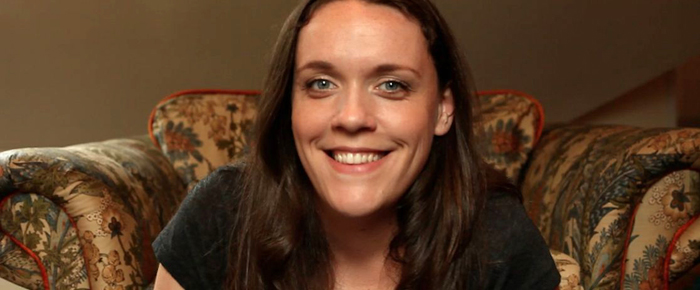
By Eleni P. Austin
Lucy Wainwright Roche has a pretty impressive pedigree. She would probably prefer you don’t dwell on it. But it’s so dynastic, it bears a brief discussion.
Lucy comes from Folk-Rock royalty. Her dad, Loudon Wainwright III, began his career in the late ‘60s, one of a crop of singer-songwriters christened the “new Dylan.” Dry and laconic, Loudon was responsible for droll classics like “Dead Skunk (In The Middle Of The Road)” and “Rufus Is A Tit Man.” Lucy’s half-siblings are Rufus and Martha Wainwright, also successful singer-songwriters. (Their mother was the late great Kate McGarrigle, part of Canadian folk duo, the McGarrigle Sisters)
Lucy’s mother, Suzzy (rhymes with fuzzy) Roche is the youngest sister in the folk trio the Roches. The Roches burst on the Greenwich Village scene in the late 70s. On songs like “We” and “The Death Of Suzzy Roche” the blend was achingly pure sororal harmonies with lyrics that were both meta and mordant, feminist and funny. In 1979, their self-titled debut was named Album Of The Year by the New York Times.
Lucy grew up in recording studios, backstage and on tour. Initially, she shied away from the family business, attending college and grad school. She spent a couple of years as an elementary school teacher in New York.
In 2005 she spent some time on tour with her brother, Rufus. Something clicked and she began writing her own songs. She recorded a couple of EPs, 8 Songs (2007) and 8 More (2008). Her first full-length, Lucy arrived in 2010.
Instead of going the conventional route, recording new material and “shopping” it to labels, Lucy decided to finance her new effort herself. A lot of artists raise funds through Kickstarter, but Lucy appealed directly to her fans by offering up unreleased songs for download and playing house concerts in private homes. The result is her sophomore album, There’s A Last Time For Everything.
Opening with a sustained piano note and woozy violin, “The Year Will End Again” feels hushed and tentative. The instrumentation builds slowly, the lyrics gently remind us if we esitate, we are lost.
Four tracks, “Seek And Hide,” “Last Time,” “Look Busy”and “The Same” explore the myriad complications of love. “Seek And Hide” is wry and rambling. Anchored tumbling drums and shimmering 12-string guitar, the arrangement is fortified by whistle, hammered dulcimer, vibraphone, bells, piano and organ.
Decemberists front man, Colin Meloy adds sympathetic vocals as Lucy sketches out a lonely scenario… “I fell in love last year, it’s not a thing I do a lot/ Pack up all my lonely habits, give it all I got/ And when the winter came, I thought I would be different but I’m not/ I’m just the same old sorry kettle-calling blackest pot.”
The rickety rhythm on the sing-songy “Last Time” is provided by percussion zippers. The lyrics examine how relationships change over time… “So now an ancient era ends, a few moments for us to spend/ You’re just not quite still mine outright and we will never be here again.”
“Look Busy” is a piano driven ballad that limns the ache of heartbreak. Lucy offers sage advice on how to navigate the post break-up misery… “One day without notice you will see the light of day, this I can nearly guarantee/Forgetting to remember that she’s even gone away. In the meantime, look busy.”
Couched is a lush melody, “The Same” is wistful and clear-eyed. A trenchant assessment of a relationship that worked…until it didn’t.
Both “Canterbury Song” and “Seven Sundays” evoke the quiet pleasures of childhood. The former is propelled by a martial cadence and swooping-seagull guitar riffs. The narrator seems ready for a very specific adventure…”In my pocket I will carry all the true things, the leaves and marbles, paper plans and subway fare/ With our keys strung round our necks, on dusty shoe soles we’ll be there.”
More mischievous activities are recounted on the latter… “Me and you crept on for hours, back behind the big blue house/Pulled the roots up all her flowers, so to feed all our creatures mouths.” Here the delicate melody is tethered by plucked banjo notes, graceful trumpet fills and feathery French horn runs.
Other interesting tracks include the loping “Monte Rosa Range” and the incandescent waltz, “Quiet Time.” “Call Your Girlfriend,” was originally a frenetic set of instructions set to music, written and recorded by Swedish dance Diva, Robyn. Lucy’s version is stripped bare, a stark acoustic ballad that feels more empathetic.
The album closes with “Under The Gun,” a poignant and philosophical break up song, highlighted by Lucy’s angelic vocals.
There’s A Last Time For Everything was co-produced by Lucy and multi-instrumentalist, Jordan Brooke Hamlin. Mary Chapin Carpenter, Colin Meloy and Robby Hecht provide additional vocals, and Allison Miller (formerly with Ani Difranco) played drums.
For Lucy Wainwright Roche, music seems encoded in her DNA. Thankfully for us she has embraced her destiny, continuing a rich family legacy.


















































